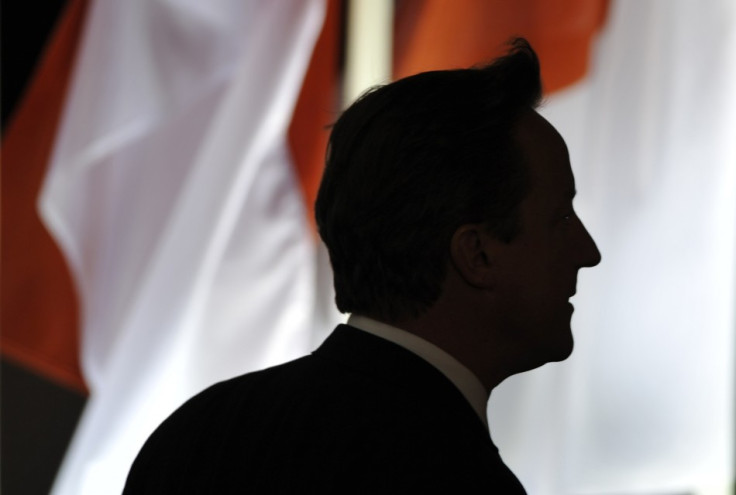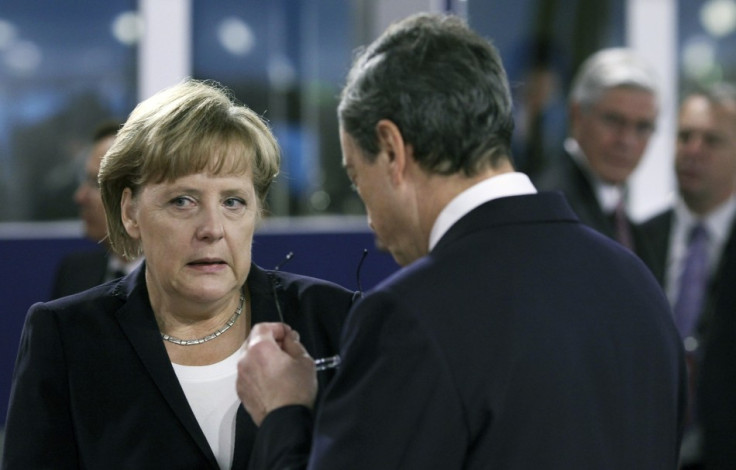Eurozone Crisis: Tories Forced into Corner Over Robin Hood Tax

The prime minister, David Cameron, and the Chancellor of the Exchequer, George Osborne, are being attacked at home and abroad over their decision to oppose an EU Financial Transaction Tax (FTT).
Senior ally of the German administration, Volker Kauder, parliamentary leader of Mrs Merkel's conservative Christian Democrats, said that Britain "would not get away" with looking after its own interests at the expense of Europe and insisted that if the EU was to be a success the UK must adopt the FTT, dubbed "the Robin Hood tax."
The Chancellor, George Osborne, warned earlier that its implementation would be a "bullet into the heart of London," insisting the tax would risk damaging the UK's national interests that could mean financial services relocating to avoid paying the FTT.
He said it would be "economic suicide" for the EU to impose the tax unilaterally, giving a massive advantage to rivals like the US and China.
But editor of the International Tax Review, Jack Grocott, said: "Banks and people won't relocate. London will not disappear and thanks to geography and time zones, will remain at the centre of the global financial world."
The Robin Hood Tax organisation, the campaign group that founded in 2009, released a number of short videos featuring Bill Nighy explaining the tax would be a fraction (0.05pc) and could potentially raise billions of pounds for the UK economy.
Spokesman, Simon Chouffot, said: "If you look at the government's 2.5pc VAT rise, a transaction tax on the consumer which famously hits the poorest people hardest, the FTT tax is a fraction of that tax hike."
He also concurred: "Why would banks want to relocate? Here they have been protected by the taxpayer's money through billions of pounds worth bailout funds."
A Treasury spokesman said: "Although we're talking about a small tax, the small amount will end up amounting to millions of pounds, and if the FTT tax is not made a global condition these banks can move to New York or Hong Kong that would hugely affect business in the UK."

Tory EU scepticism
Speaking at the Lord Mayor of London's banquet on Monday, Cameron admitted he was a sceptic of the EU, calling its rules and regulation "pointless". He added that the eurozone crisis as a chance to "redraw the EU", suggesting he would look to repatriate powers from Brussels to Westminster.
Grocott said the FTT and the speech were linked: Osborne's opposition could be born from the divisive the FTT has caused across Europe. With the FTT having the support of France and Germany, and when they support something in the EU then it usually follows through, and the UK trying to distance itself from the crisis in the eurozone, it would seem Osborne's opposition is likely to continue.
Mr Kauder, leader of Germany's Christian Democrats, told the party's congress: "I can understand that the British don't want that when they generate almost 30% of their gross domestic product from financial-market business in the City of London.
"But Britain also carries responsibility for making Europe a success. Only being after their own benefit and refusing to contribute is not the message we're letting the British get away with."
Mr Kauder also claimed that Europe was falling in with Germany's approach as it tackled economic crisis.
"Now all of a sudden, Europe is speaking German. Not as a language, but in its acceptance of the instruments for which Angela Merkel has fought so hard, and with success in the end."
His intervention will infuriate eurosceptics in the Conservative Party who feel vindicated in their opposition to the European single currency by the crisis now racking the eurozone.
© Copyright IBTimes 2024. All rights reserved.





